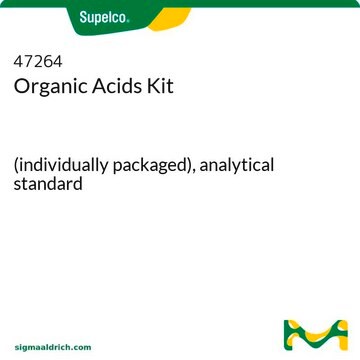913243
Acide maléique
≥99.5% (HPLC), <=0.5% water
Synonyme(s) :
Acide cis-butanedioïque, Acide toxylique
About This Item
Produits recommandés
Niveau de qualité
Description
Residue on Ignition: <= 0.1%
Pureté
≥99.5% (HPLC)
≥99.5% anhydrous basis (HPLC)
Forme
powder
Couleur
white to off-white
Pf
130-135 °C (lit.)
137-140 °C (lit)
Densité
1.59 g/mL at 20 °C (lit.)
1.59 g/mL at 25 °C (lit.)
Chaîne SMILES
OC(=O)\C=C/C(O)=O
InChI
1S/C4H4O4/c5-3(6)1-2-4(7)8/h1-2H,(H,5,6)(H,7,8)/b2-1-
Clé InChI
VZCYOOQTPOCHFL-UPHRSURJSA-N
Vous recherchez des produits similaires ? Visite Guide de comparaison des produits
Description générale
Application
Maleic acid has been used in constructing polymeric solid electrolytes for battery and fuel cell research. Maleic acid based polymer blend were reported to increase the ionic conductivity of PEO basd polymer solid electrolytes by suppressing crystallization.
Maleic acid has also been used to make superswelling acrylamide (AAm)/maleic acid (MA) hydrogels by free radical polymerization in aqueous solution of AAm with MA as comonomer with some multifunctional crosslinkers such as trimethylolpropane triacrylate and 1,4-butanediol dimethacrylate. In this hydrogel system, the uptake of cationic dye increased with an increase of MA content in the AAm/MA hydrogels.
Mention d'avertissement
Danger
Mentions de danger
Conseils de prudence
Classification des risques
Acute Tox. 4 Dermal - Acute Tox. 4 Oral - Eye Dam. 1 - Skin Corr. 1 - Skin Sens. 1 - STOT SE 3
Organes cibles
Respiratory system
Code de la classe de stockage
8A - Combustible corrosive hazardous materials
Classe de danger pour l'eau (WGK)
WGK 1
Faites votre choix parmi les versions les plus récentes :
Certificats d'analyse (COA)
Vous ne trouvez pas la bonne version ?
Si vous avez besoin d'une version particulière, vous pouvez rechercher un certificat spécifique par le numéro de lot.
Déjà en possession de ce produit ?
Retrouvez la documentation relative aux produits que vous avez récemment achetés dans la Bibliothèque de documents.
Notre équipe de scientifiques dispose d'une expérience dans tous les secteurs de la recherche, notamment en sciences de la vie, science des matériaux, synthèse chimique, chromatographie, analyse et dans de nombreux autres domaines..
Contacter notre Service technique




